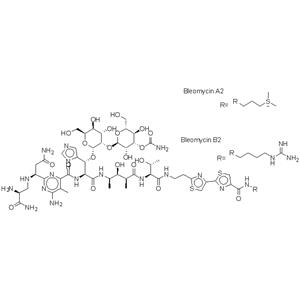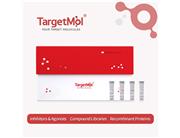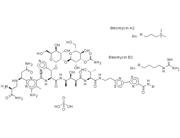| Name | Bleomycin hydrochloride |
| Description | Bleomycin hydrochloride is a potent antitumor antibiotic that functions as a DNA synthesis inhibitor and DNA damaging agent. |
| In vitro | Bleomycin hydrochloride is a well-studied micronucleus inducer in human lymphocytes with various genotoxic mechanisms, frequently causing single and double strand breaks and single apurinic/apyrimidinic sites. As a radiomimetic compound, it closely mimics the genetic effects of ionizing radiation[1]. The IC50 of Bleomycin hydrochloride is 4.0±1.3 nM for the UT-SCC-19A cell line, whereas UT-SCC-12A and UT-SCC-12B are more resistant, with IC50 values of 14.2±2.8 nM and 13.0±1.1 nM, respectively[2]. Bleomycin hydrochloride (50, 100 μM; for 24, 48 h) induces pulmonary fibrosis in RLE-6TN cells (50 μM) and A549 cells (100 μM)[4]. |
| In vivo | Bleomycin hydrochloride treatment (3.5-4.0 mg/kg; intra-tracheal) on day 0, body weights decreases by day 4 then increases by Day 7 through the end of the study[3]. Bleomycin hydrochloride (3.5-4.0 mg/kg; intra-tracheal) produces a statistically significant increase in lung hydroxyproline levels, and also increases right caudal lung lobe mass[3]. Bleomycin hydrochloride (intratracheal instillation; 5.0 mg/kg/day) induces pulmonary fibrosis in eighty 8-week-old male BALB/c mice with weight about 20-30 g. Bleomycin induces the expression levels of α-SMA and collagen I[4]. Bleomycin hydrochloride (intratracheally; 2.5 mg/kg; 1.25 mg/ml, approximately 50 µl per mouse) induces pulmonary fibrosis in male C57BL/6 mice (8 weeks old, average weight approximately 24.5 g)[5]. |
| Storage | store at low temperature,keep away from direct sunlight | Shipping with blue ice. |
| Solubility Information | DMSO : 45 mg/mL (31 mM), Sonication and heating to 60℃ are recommended.
H2O : 80 mg/mL (55.13 mM), Sonication is recommended.
|
| Keywords | Bleomycinhydrochloride | Bleomycin Hydrochloride |
| Inhibitors Related | Rifampicin | 5-Fluorouracil | Ribavirin | Guanidine hydrochloride | 2,4-D | Resveratrol | Trimethoprim | Azelaic acid | Acyclovir | Thymidine | Temozolomide | Folic acid |

 United States
United States



